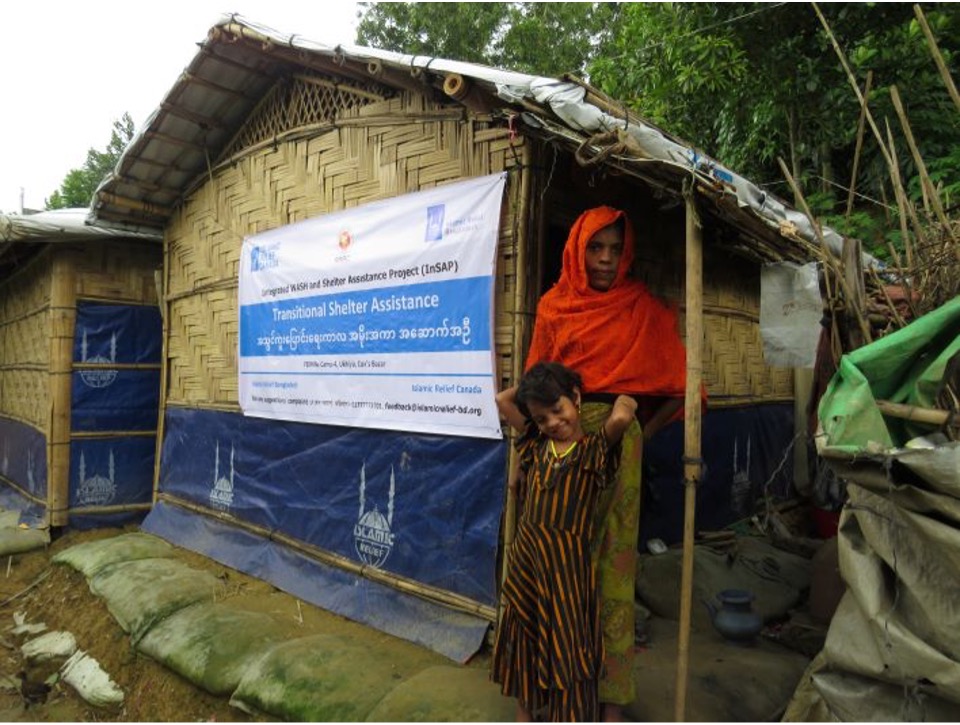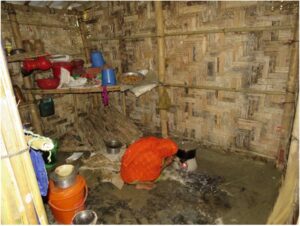
The scorching sun beats down on Camp-4 in Kutupalong, Bangladesh, home to more than 35,000 Rohingya refugees who fled unspeakable violence in Myanmar. Among them is 36-year-old Nasima, whose story reveals the particular vulnerabilities women face in humanitarian crises.
As we mark 16 Days of Activism Against Gender-Based Violence, we share the story of Nasima, a Rohingya refugee whose journey from persecution to resilience reminds us why safe shelter is a fundamental right for all women and girls.
When home becomes a memory
In December 2017, Nasima’s world collapsed. The Myanmar army’s brutal campaign against the Rohingya forced her family to make an impossible choice: stay and face persecution, or flee into the unknown. Like nearly 1 million others, Nasima chose survival, but it came at a devastating cost.
During their desperate escape, Myanmar soldiers opened fire on Nasima’s family. The bullets found their mark, leaving her with severe injuries that would alter the course of her life. The physical wounds were profound, but the invisible scars ran deeper still. The trauma shattered not only her body but her sense of safety in the world.
Today, Nasima lives with her 6-year-old daughter Yasmin in a refugee camp where nearly 8,000 families grapple with the daily struggle for survival. With no source of income and limited mobility due to her injuries, Nasima embodies the vulnerabilities that women in humanitarian settings face – vulnerabilities that the 16 Days of Activism campaign seeks to address.
The weight of unsafe shelter
For 2 years, Nasima and Yasmin were forced to live in a deteriorating bamboo shelter. The structure, ravaged by weather and termites, offered little more than a symbolic roof over their heads. Damaged tarpaulins provided scant protection against the region’s punishing sun and monsoon rains. The flimsy fencing was no barrier at all.
“I used to live in a small bamboo shelter, and I was always sceptical about its durability,” Nasima recalls. “Whenever there was a strong wind, I feared that the shelter might not withstand it.”
This constant state of fear is something women in crisis settings know well. When your home cannot protect you from the elements, you are vulnerable to everything. For women like Nasima – living with physical disabilities and mental trauma – an unstable shelter exacerbates the daily challenges of camp life and increases exposure to gender-based violence.
The dignity of safe shelter
Hope arrived in January 2023 when Islamic Relief launched the Integrated WASH and Shelter Assistance Project (InSAP) in Camp-4. Through careful assessment, Islamic Relief identified the families most in need – those whose shelters had become dangerous rather than protective. Nasima qualified for the programme, receiving more than just materials.
Islamic Relief built a new shelter for Nasima. Strong bamboo replaced rotting posts. Secure tarpaulins replaced tattered sheets. A proper structure replaced a precarious assemblage. For the first time since fleeing Myanmar, Nasima and Yasmin had a home that could protect them.
“We are incredibly grateful for the support from Islamic Relief Bangladesh,” Nasima says, her voice carrying relief. “This new shelter provides a sense of security and comfort we haven’t experienced in years. It’s a life-changing intervention that we won’t forget.”
Islamic Relief also provided mosquito nets to protect against disease, Qurbani meat during celebrations, winter clothes against the cold, and Ramadan food parcels. But as this year’s 16 Days of Activism campaign reminds us, women’s safety requires sustained investment and commitment.

The transformative power of aid
As we observe the 16 Days of Activism Against Gender-Based Violence, Nasima’s journey from a bullet-riddled escape to a safe shelter reminds us of our collective responsibility. Nearly 1 in 3 women worldwide experiences violence in their lifetime. In humanitarian emergencies, these risks intensify.
Safe shelter is both practical intervention and powerful statement: every woman and girl deserves protection, dignity, and the chance to live without fear. Nasima’s resilience shows us what becomes possible when humanitarian assistance recognises the specific vulnerabilities women face and responds with comprehensive, compassionate support.
Shelter to Nasima and Yasmin represent more than walls and a roof, it symbolises a future where safety for women is not a luxury, but a fundamental right.
This 16 Days of Activism Against Gender-Based Violence, Islamic Relief Worldwide stands with women and girls facing violence, displacement, and insecurity worldwide. Together, we can build a future where every woman has access to safety, dignity, and hope. Donate now to help women and girls like Nasima and Yasmin.



